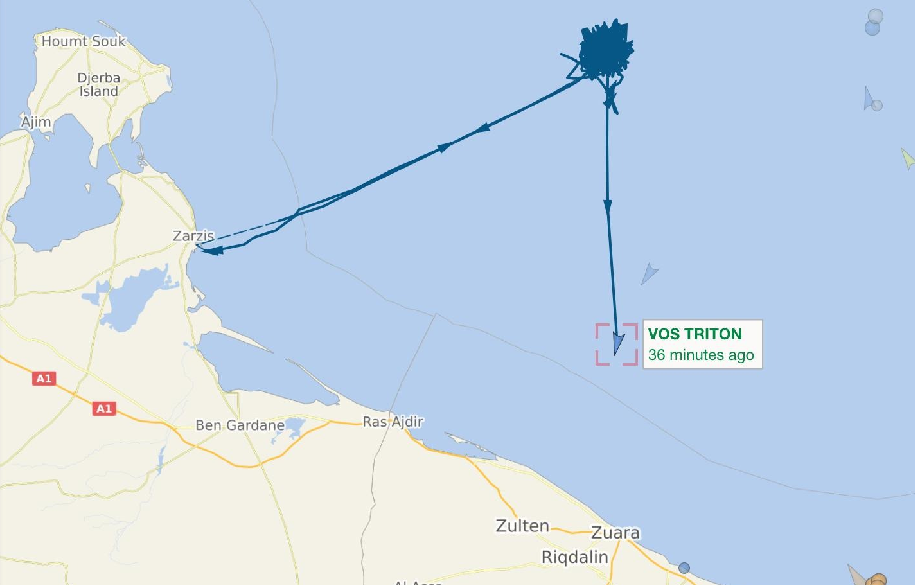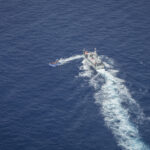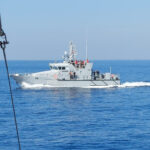According to the United Nations, more than 2,200 people have already drowned in the central Mediterranean this year. The Alarm Phone network criticises a “rescue gap”.
At least 61 people drowned in a boat accident off the coast of Libya on Saturday night. This was announced by the International Organisation for Migration (IOM), which is part of the United Nations, on the short message service X, formerly Twitter. Survivors reported that there were 86 people on the rubber dinghy. They had made their way to Europe from the Libyan coastal town of Zuwara.
The people on board reportedly contacted the Alarm Phone network and reported a maritime emergency in international waters, the activists wrote on X. The network then alerted the relevant authorities, including the Libyan coastguard, which did not take any rescue measures regarding the boat in distress. The criminalisation of non-governmental organisations and the therefor following “rescue gap” has once again proved fatal, criticises Alarm Phone. The only available civilian rescue ship was more than twelve hours away, they say.
In a more detailed report the network explained on Monday about the calls from the group in distress. Though initially suggesting that they would send a patrol vessel, Libyan authorities stated that they would not send out any rescue asset, due to high waves. But Alarm Phone knows about at least two assets of the Libyan coastguard which were out at sea during the day to intercept at least 3 boats and bring the people back to Libya.
According to the IOM, the 25 survivors of the boat accident were rescued and brought to Libya by the merchant ship “Vos Triton”, which flies the flag of Gibraltar, and handed over to Libyan authorities. The people were then taken to a detention centre. Such centres are run by Libyan militias and are regarded as a place of abuse, torture and murder by the guards.
The EU border agency Frontex was also active in the region with two aircraft from Friday evening to Saturday morning. This was reported by Italian journalist and aircraft tracker Sergio Scandura. Frontex only monitors migration movements in the central Mediterranean from the air and informs the Libyan coastguard, among others, about sightings of boats. In many cases, the coastguard brings the people back to Libya. Human rights activists describe these “pullbacks” as contrary to international law, as Libya is not a safe harbour for rescued people within the meaning of international conventions.
The principle of non-refoulement is enshrined in Article 33 of the Geneva Refugee Convention and in the European Convention on Human Rights. The UK is also a party to these treaties. As Gibraltar, the flag state of the “Vos Triton”, is a British overseas territory, the government in London is responsible for prosecuting the ship’s pullbacks. Gordon Isler, chairman of the German rescue organisation Sea Eye, draws attention to this on Platform X.
In 2021, the “Vos Triton” had already handed over around 170 people to the Libyan coastguard after a rescue. This pullback was presumably coordinated by the EU border agency. This emerges from WhatsApp messages that Frontex recently had to release as part of a freedom of information request. This was another violation of international maritime law, human rights and the right to asylum at Europe’s borders,, criticised the civilian rescue organisation Sea Watch at the time, as Libya is not a safe place, so the rescue of people cannot be considered complete when disembarking them in the country.
After Tunisia had become the main departure point for boats carrying asylum seekers to Europe, most of them are now leaving Libya again in unseaworthy rubber dinghies as they flee war and poverty. “The central Mediterranean continues to be one of the world’s most dangerous migration routes”, wrote the IOM on X, adding that more than 2,200 people have already drowned there this year. This is a “dramatic number” that proves that not enough is being done to save lives at sea, said an IOM spokesperson on Saturday evening. According to the UN organisation, more than 20,000 people have died or are missing in the Mediterranean since 2014.
Published in German in „nd“.
Image: Alarm Phone.





Leave a Reply